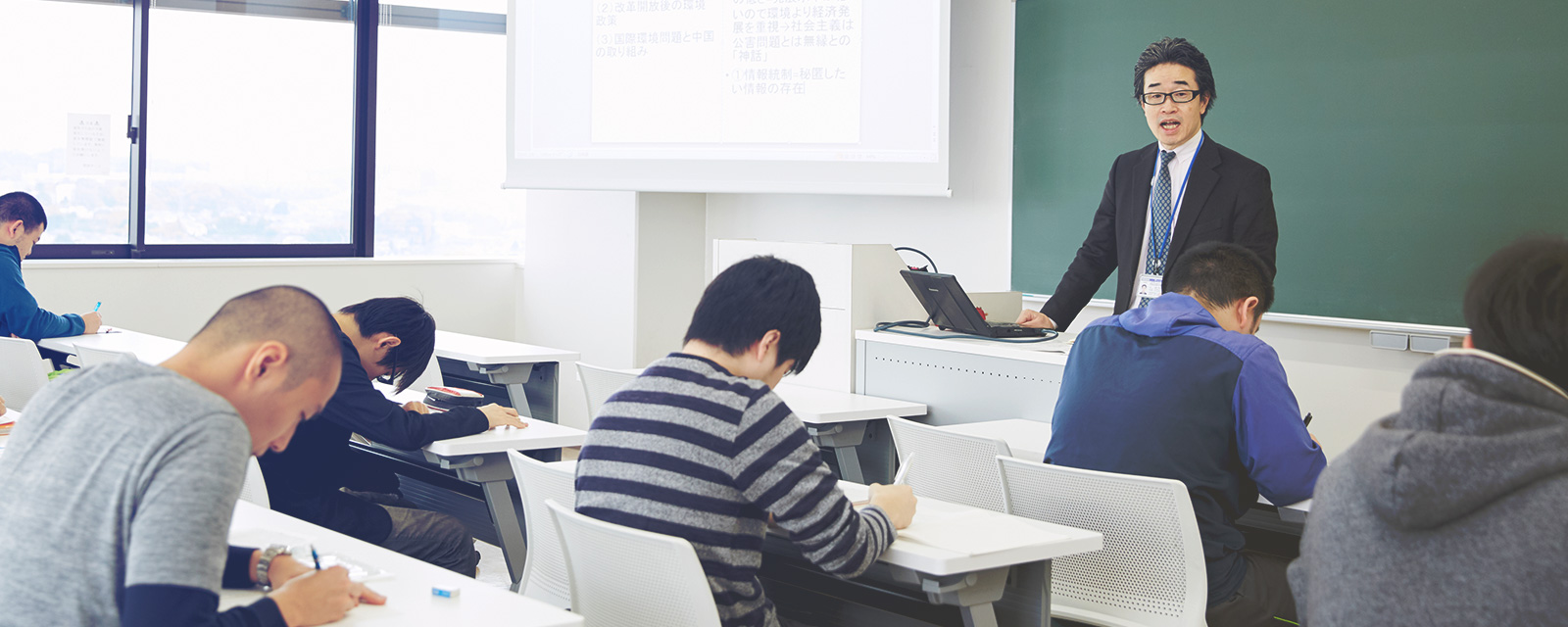
- 八王子キャンパス
経済学部 国際経済学科

- 八王子キャンパス

世界で活躍できる
グローバルな人材を育成します
急速に進むグローバル化のもと、日本経済の発展と持続のために、世界やアジアとの経済関係の重要さが増しています。国際経済学科では、国際経済の基礎から応用、多様性に富んだアジア・アメリカ・EUなどの世界のさまざまな国の経済・社会・政治を学ぶだけでなく、海外研修プログラムなどを通して英語力の向上をめざし、国内外で活躍できる素養を身につけます。

アジア国際交流プログラム(TAEP)
経済学部では、日本とアジアの発展に貢献する人材の育成を目的に、帝京大学アジア交流プログラム(TAEP)を発足しました。現在、ホーチミン市外国語情報技術大学(ベトナム)、パンヤピワット経営学院(タイ)、ヤンゴン経済大学(ミャンマー)、ジェンデラル・スディルマン大学(インドネシア)、パニャサストラ大学(カンボジア)、アダムソン大学(フィリピン)、ラオス国立大学(ラオス)の各大学と協定を結び、留学生を受け入れるなど交流プログラムを進めています。また、アジア交流プログラムの科目は複数用意されており、講義はすべて英語で行われます。
本学科ではアジアや世界の経済の実態を把握し、分析する能力を身につけるため、経済学の基礎から学び、グローバル化・国際経済・アジア経済などといった応用までを学びます。特に複雑なアジア経済を正しく理解するため、文化・歴史・政治などの分野も学習できるようカリキュラムを設定。必修科目ではプレゼンテーション能力や表現力を鍛えるため少人数教育を重視し、さまざまな課題に対する解決方法を考え、実践できる力を養います。また、英語でのコミュニケーション能力を向上させるため、多くの英語科目を配置し、グローバルな人材に期待される英語力を鍛えます。
文化と経済
国際経済の理解とは、他国の経済を理解するということです。言語をはじめ、さまざまな文化的背景が異なれば、社会の成立のあり方や経済の機能の仕方も変わります。経済は多様なルールや制度に基づいて機能しており、経済を理解するためにその基盤となっている文化を知る必要があります。本授業はオムニバス形式で行い、世界や地域経済の文化的背景や各国の文化について、理解を深めていきます。
政治経済英語
今日のニュースは英語で報道されることが多く、英語は最新情報を入手するための大切な言語です。英語圏の国に限らず、日本を含め多数の国で英字新聞が存在し、英語で各国の事情、経済や政治に関する考え方などを知ることができます。授業では多くの地域の新聞を読み、さまざまな問題を取り上げます。英語圏の著名な新聞以外にも、アジア、ヨーロッパなどの英字新聞を読み、世界の政治経済の情勢を考察します。
アジア経済史
前近代から近代にかけてのアジアの経済史を学びます。日本を含めた東アジアや東南アジアを考察の対象とし、現代のアジア社会がどのように形成されてきたのかという問題について基本的な理解を深めていきます。日本の江戸時代における鎖国制度とその実態といった問題から、当時、アジアの各地域が海を介して強く結びついていた点を確認し、その世界がイギリスを中心とした欧米勢力の登場によりどのように変化していったのかという歴史を論じます。
国際経済入門
世界各国が抱えている経済面の問題・課題を多面的に取り上げます。世界経済はアメリカの金利引き上げ、中国の経済成長の行方など、さまざまな要因によって左右されます。そのほかインド、東南アジア諸国連合(ASEAN)など主立った国や地域の経済を動かすメカニズムを学ぶと同時に、経済が政治や社会の動きによってどのような影響を受けるかについても理解を深めます。
GPA(Grade Point Average)制度の導入の趣旨は、1. キャンパスとして統一した基準を作成すること、2. 公平性に優れた基準であること、3. 国際的に通用する基準であることとし、学修の成果をGPAという客観的な数値で評価するものです。またこの制度は、欧米の大学で採用されている成績評価制度に概ね準拠しており、海外留学、海外の大学院進学、外資系企業への就職などの際に学力を証明する指標として、海外でも通用する成績評価制度となっています。
| 区分 | 評価 | GPA | 成績評価基準 | 評価内容 | 英文内容 |
|---|---|---|---|---|---|
| 合格 | S | 4.0 | 90点以上 | 特に優れた成績を表します | Excellent |
| A | 3.0 | 80点台 | 優れた成績を表します | Good | |
| B | 2.0 | 70点台 | 妥当と認められる成績を表します | Satisfactory | |
| C | 1.0 | 60点台 | 合格と認められる最低限の成績を表します | Pass | |
| 不合格 | D | 0.0 | 60点未満 | 合格と認められる最低限の成績に達していないことを表します。また、授業等の出席日数不足および当該授業における試験の未受験等も含みます | Failure |
| 対象外 | N | - | - | 編入や留学等により他大学等で修得した科目を本学の単位として認定したことを表します(単位認定科目) | Credits Transferred |

| 科目区分 | 必修・選択の例 | 所要単数 | |||||
|---|---|---|---|---|---|---|---|
| 共 通 教 育 科 目 ※4 | 教養 教育科目 | 人文科学系分野 | 選択必修 | 2以上 | 8以上 | 30※1 | |
| 社会科学系分野 | 2以上 | ||||||
| 自然科学系分野 | 2以上 | ||||||
| 文理融合分野 | 選択 | - | |||||
| 初年次 教育科目 | ライフデザイン演習Ⅰ・Ⅱ | 必修 | 2 | ||||
| キャリア 教育科目 | キャリア入門 | 必修 | 2 | ||||
| 情報教育科目 | 選択必修 | 2 | |||||
| 外国語 教育科目 | 現代英語Ⅰ~Ⅷ | 必修 | 12 | ||||
| 実用英語Ⅰ~Ⅳ | |||||||
| 専門科目※4 | 必修 | 8 | 74※3 | ||||
| 選択 必修※2 | 展開・ 総合科目 | 4 | |||||
| 経済学部 入門科目 | 16 | ||||||
| 国際経済 ・基礎 | 20 | ||||||
| 選択 | 26 | ||||||
| 自由選択 | ・専門科目74単位の超過単位 ・共通教育科目30単位の超過単位 ・オープン科目の修得単位 ・副専攻プログラムの修得単位 ・他大学での認定単位 | 選択 | 20 | ||||
| 合計 | 124 | ||||||